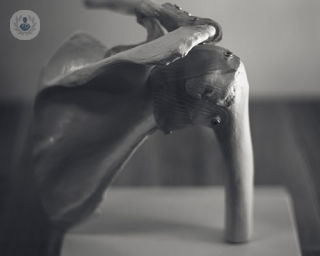Frozen shoulder
Mr Andrew Chambler - Orthopaedic surgery
Created on: 11-13-2012
Updated on: 10-26-2023
Edited by: Conor Lynch
What is meant by the medical term 'frozen shoulder'?
A frozen shoulder is a condition that causes pain and stiffness in the shoulder and hence, a loss of mobility. The shoulder joint capsule has ligaments that hold the shoulder bones together, and when this capsule becomes inflamed, the bones are not able to move freely in the joint, causing a stiffened, frozen shoulder.

What is the prognosis of a frozen shoulder?
Typically, frozen shoulder treatments help to restore mobility and the functioning of the shoulder after one year. In cases that are treated by surgery, this should be followed with physical therapy for a few weeks or months to prevent the frozen shoulder from returning.
What are the symptoms of a frozen shoulder?
The main symptoms of frozen shoulder are pain, stiffness, and decreased joint mobility.
How is a frozen shoulder diagnosed?
To make a diagnosis of frozen shoulder, the specialist will ask the patient about their symptoms, examine the shoulder, and they may also require X-rays or, less often, an MRI scan.
What causes a frozen shoulder?
There are no specific causes of a frozen shoulder, although it is believed that hormone changes are of the main possible causes.
How can a frozen shoulder be prevented?
Generally, a frozen shoulder cannot be prevented. However, if you have suffered a shoulder injury or have recently had shoulder surgery, you should practise certain exercises to keep the joint mobile and avoid stiffening. If your shoulder does become stiff, you should see a specialist as soon as possible.

How is a frozen shoulder treated?
Frozen shoulders can be treated with NSAIDs and steroid injections, in addition to physical therapy. It may take a few weeks to see progress, and a few months to achieve a full recovery.
Which specialist treats frozen shoulder?
Orthopaedic surgeons are the medical professionals that typically treat cases of frozen shoulder.
How can I ease frozen shoulder pain myself at home?
Applying heat packs can be an extremely effective way for one to ease the pain caused by their frozen shoulder. Also, maintaining movement of the shoulder is one of the best ways to avoid frozen shoulder and reduce and relieve the shoulder pain.
How long can frozen shoulder last?
Typically, frozen shoulder lasts anywhere between one and a half to three years. In some cases, it can actually last a bit longer, but, thankfully, in 99 per cent of cases, pain and stiffness in the shoulder will eventually go away.
When should I see a doctor for my frozen shoulder?
Patients should certainly see a GP if they experience shoulder pain that is so intense that it becomes extremely difficult to move the arm and shoulder. In addition to this, patients should seek medical attention for their frozen shoulder if they notice that their shoulder pain and stiffness is not going away, and if they experience extreme shoulder pain at nightWhat are the different stages of a frozen shoulder?
In total, there are three different stages of a frozen shoulder, which are as follows:
- The freezing stage: this is when the shoulder pain begins to intensify.
- The frozen stage: the stage when the patient notices their shoulder becoming increasingly stiff.
- The thawing stage: the final stage of a frozen shoulder, where the range of motion in one's shoulder gradually starts to return.
When should surgery be considered for frozen shoulder?
Surgery is generally performed to treat a frozen shoulder when, and only when, the more conservative treatment options have failed.
How is frozen shoulder surgery performed?
Frozen shoulder surgery is, more often that not, performed in a minimally invasive manner. The surgeon will make a number of small incisions around the patient's shoulder joint, before inserting a thin, pencil-sized instrument called an arthroscope into the joint. This will stretch and release the stiffened joint capsule, which will effectively break down scar tissue.
What are the main risk factors?
There are a host of different risk factors associated with frozen shoulder. The main ones include the following:
- being over the age of 40
- having diabetes
- having a lung disease
- having breast cancer
- having thyroid gland-affecting diseases
- having Parkinson's disease
- having had a stroke
- having suffered from a shoulder injury
Can anxiety and stress lead to a frozen shoulder?
Yes, anxiety and stress can indeed cause a frozen shoulder. It has been proven that prolonged levels of stress, anxiety, and/or depression lead to increased muscle and limb pain and disability.

















